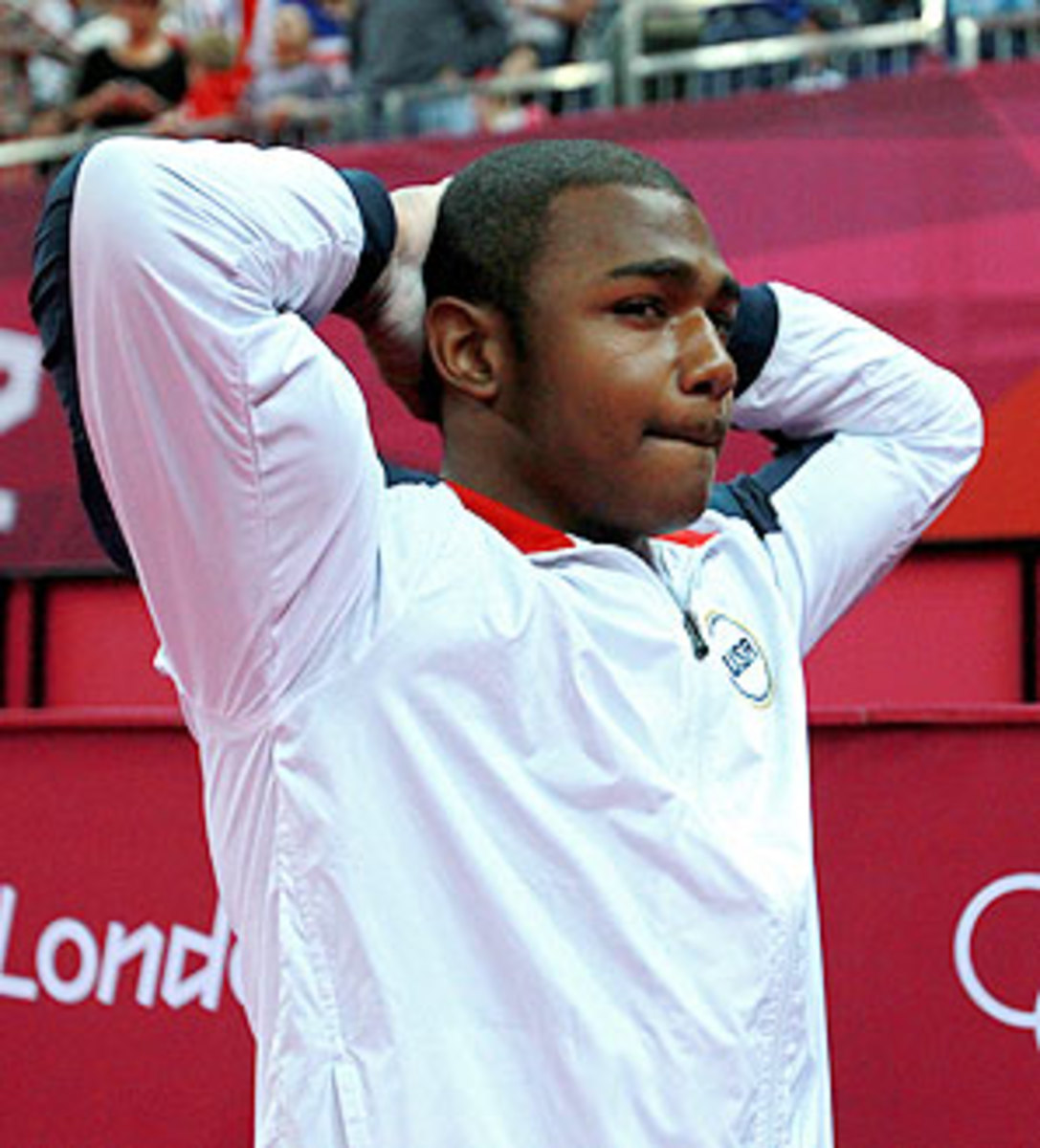Youth, inexperience on display as U.S. men's gymnastics team flops
But there they were in the bowels of North Greenwich Arena on Monday, trying to explain how it had all gone so wrong. They were like young drivers who had moved from side streets to the freeway for the first time and realized, Wow, that's harder than it looks. In the moments right after competition, they were too young and too humbled to get into technical analysis. Orozco was asked, What exactly was the problem on your vault? "I fell on my butt," he said. Someone asked Leyva if inexperience had been a factor. "I didn't know what to expect, but now I do," he said, referring to Olympic competition. "Now I know what the crowd is going to be like, now I know what the air is going to taste like."
And what exactly does the air taste like? "Like chalk dust," Leyva said.
Both those comments were made with smiles, even if they were smiles of embarrassment. Maybe the U.S. men would have been saltier if they hadn't at least recovered after a horrible beginning to finish the last rotations well, though it was far too late to make it to the medal stand by then.
In digging themselves an early hole, Leyva took the shovel first. He faltered badly on the pommel horse on the opening rotation, coming completely off the apparatus before going back to complete his dismount. Orozco followed with an equally clumsy routine, and the U.S. was seventh out of the eight teams after the first rotation.
Then came the problems on the vault, on which Orozco stumbled backward on his landing and yes, fell on his butt. That helped doom the U.S. to only the sixth-best score on vault, and essentially ended any hopes of a medal, much less the gold, which would go to China, with Japan getting the silver medal and Great Britain surprisingly grabbing the bronze. By the time they reached the fifth of the sixth rotations, the parallel bars, the chant of "USA! USA!" from the American fans in the crowd sounded half-hearted at best.
[Nick Zaccardi: World's top gymnast at center of scoring controversy]
After Orozco's miscue, he provided the image that symbolized the U.S. men's evening, his face tightening, with tears welling up in his eyes. That's when team captain Jonathan Horton, the old man of the group at 26 and the only returning member of the 2008 team, went over to sit beside him.
"I told him not to dwell on it," Horton said. "I told him we had to just keep fighting. We're still Olympians."
They may well be Olympians again, since they are all young enough to come back and atone for what happened Monday night. Even Horton said Monday that he plans to be in Rio in 2016, and there are the individual competitions still to come in these Games. By then, perhaps they will be able to handle the jitters that were so evident that they couldn't even do a convincing job of pretending otherwise after the competition on Monday. Asked if the magnitude of the moment was a factor in the team's subpar performance, assistant coach Tom Meadows hesitated for five seconds before responding, his silence saying more than his words.
"We've got a young group, but these guys are really good and they're tough. I don't know if I'd say it was nerves as much as it was just not coming out as strong as they have in the past. Little mistakes become big mistakes when you're competing against all these great teams."
[Luke Winn: The scene from a day of gymnastics]
But it was the U.S. that was supposed to be a great team. Leyva is the reigning world champion on the parallel bars. Horton was second on the horizontal bar at the Beijing Olympics. Orozco was the best all-around performer of them all. There was the team performance in preliminaries, the scores of which, sadly for the Americans, do not carry over into the final. The U.S. team was overflowing with confidence after Saturday.
"I think we made a very big statement," Horton said after qualifying. "I think we showed people that we're not all talk. We have made a lot of big statements and we put a lot pressure and expectations on ourselves and I think we showed the world that we are capable of reaching this goal. All five of us have one thing in mind, this team gold medal."
Horton said he woke up Monday morning thinking that "this might be the day it happens. This might be the day I stand up on the podium with my teammates and hear The Star-Spangled Banner play." Instead it turned into the night he stood in a dimly lit basement of an arena, talking about dreams gone wrong.
"I do believe it will still happen," he said. "I'm an old guy, and if I think it can still happen, all these young guys definitely should."
It was time to focus on the future, on opportunities to come. Youth may have been the telling weakness for the Americans on Monday night. Now it becomes their strength.





